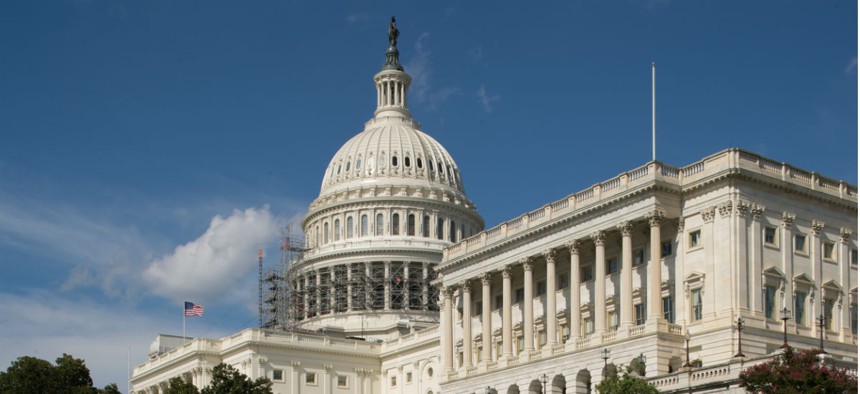
U.S. Architect of the Capitol
Uncertainty Over a Shutdown, Forcing Hill Staffers Onto VA Health Care and More
A weekly roundup of pay and benefits news.
As mid-September approaches, time is running out for lawmakers to reach a deal that would keep government open past the end of the fiscal year on Sept. 30. Things looked promising earlier this week, with reports that progress had been made in the Senate toward a short-term continuing resolution that would bridge any gap in appropriations. But the outlook by mid-day Wednesday was a little less certain: Senate Democratic leader Harry Reid told reporters that “lots of problems” remained with a Republican stopgap spending proposal, according to The Hill. For one, Republicans do not want any of the money allotted to fight the Zika virus in Puerto Rico to go toward Planned Parenthood clinics.
It still seems likely that a spending deal will be reached to avoid a shutdown and the ensuing disruption to pay and benefits, but federal employees will have to hold their breath a bit longer to see exactly what shape that deal will take.
As spending negotiations are under way, lawmakers are also considering reforms to the Veterans Affairs Department. The House is taking up a bill that would seek to hold all employees at VA more accountable for their job performance. The VA Accountability First and Appeals Modernization Act (H.R. 5620) would change the disciplinary process for VA employees and top career officials at the department, essentially by reducing the time allotted for it to play out. The measure also would give the secretary clear authority to rescind bonuses, retirement benefits and relocation expenses from employees under certain circumstances, and would prohibit all VA senior executives from receiving awards or bonuses from fiscal 2017 through 2021.
The White House has expressed opposition to the measure, but stopped short of threatening to veto it. “The administration is strongly committed to strict accountability standards that ensure VA employees act with the best interests of veterans in mind, and instances of misconduct or poor performance in carrying out these duties cannot be tolerated,” officials said in a Sept. 12 statement. “But the administration believes that the approach to accountability in the legislation – focused primarily on firing or demoting employees without appropriate or meaningful procedural protections – is misguided and burdensome. This approach significantly alters and diminishes important rights and protections that are available to the vast majority of other employees across the government and which are essential to safeguarding employees' rights and the merit system.”
Meanwhile, one lawmaker is peddling another approach to VA accountability. Rep. Warren Davidson, R-Ohio, has introduced a bill that would require his colleagues to receive health care through the Veterans Affairs Department.
“Providing our veterans with the highest quality care is a bipartisan issue, one which nearly all the presidential candidates ran on,” he said in a statement. “Overhauling the VA is no easy task and will require consistent and intentional congressional oversight for years to come. My bill will ensure members of Congress have stakes in improving the failing program for our veterans.”
This would be the second politically motivated change in health care for members of Congress and their staff in recent years. Lawmakers have already been forced to take a dose of their own medicine with a requirement that they leave the Federal Employees Health Benefits Program and join the public health insurance exchanges set up under the 2010 Affordable Care Act.






